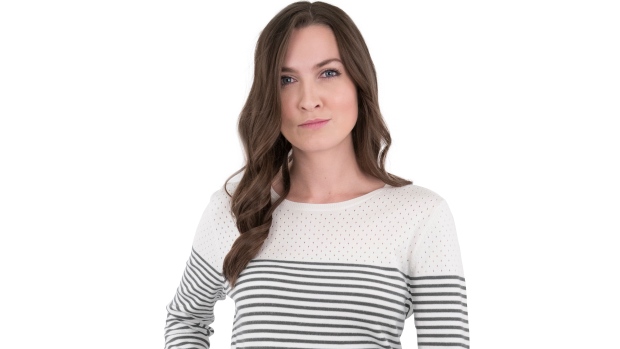Jul 13, 2018
How Costco’s ‘halo’ is keeping the Jacob clothing brand alive

Canadian retailer Boutique Jacob may have sounded its own death knell when it announced it was closing its 91 stores four years ago. But today, the once iconic womenswear brand lives on – albeit on a much smaller scale.
Montreal-based Jacob, founded in 1977, now sells its clothing among stacks of other wares at retail giant Costco (COST.O), specializing in sweater and cardigan styles starting at $19.99 under a label called CHIC by Jacob.
“Jacob grew into one of Canada’s most iconic women’s fashion brands, a title it held for more than 35 years,” said Joey Basmaji, founder of Jacob, in an email interview with BNN Bloomberg. “We built a loyal customer base that has continued contacting us. We are happy that our partnership with Costco has enabled us to keep the Jacob brand alive.”
Jacob filed for bankruptcy in May 2014, and ultimately laid off about 990 employees. Like a number of Canadian retailers including Mexx and Smart Set, the company faced intense competition from an influx of new rivals, particularly international brands like Target, Zara, H&M and Forever 21.
While the Costco retail channel isn’t likely to revive Jacob as a national brand, the company is benefitting from the wholesale giant’s “halo effect,” according to Jennifer Marley, partner at Toronto-based retail advisory firm Sklar Wilton & Associates.
“Playing in [bricks-and-mortar stores] is difficult slash no longer affordable for [Jacob] so what is neat about this is it’s bringing together what I think Costco’s opportunity is – which is that Costco is Canada’s most loved retailer,” Marley said in an interview with BNN Bloomberg.

Pedestrians walk by a Jacob clothing store in Montreal, Tuesday, May 6, 2014. (THE CANADIAN PRESS/Graham Hughes)
Costco consistently ranks as the retailer with the highest brand health and approval from Canadian consumers across any category, Marley said, as its become known for curating its assortment of goods. Costco stores carry about 4,000 SKUs (stock keeping units), compared to the 30,000 found at most supermarkets, according to its website.
“The reason why consumers love it so much is for its top quality along with its low prices,” Marley said.
“For Jacob to be in there, not only is it a channel that they need because they don’t have a bricks channel anymore, it gives them this halo of Costco has selected this stuff to be really good.”
Yet it’s not just Jacob that’s benefitting from this vendor relationship. The fact that Costco has been building up its roster with clothing brands like Jacob, shows it’s strengthening beyond the grocery category, according to Marley.
Costco has gone from selling “no name brands” like its private label Kirkland, to adding well-known names that not only include Jacob but also Calvin Klein, Buffalo, Adidas and English Laundry because it “now wants to be the first choice for clothing,” she said.

A model wearing a Jacob sweater sold at Costco. (Handout/Boutique Jacob)
“People would buy clothes [at Costco], but it was one-offs. So you’d look at [clothes] when you’re going in for groceries – no one went into Costco for clothes – it was like a basket builder,” Marley said.
“But now given the brands they’re bringing in, they have a lot of selection in jeans. Jeans, socks and underwear are really high frequency purchases, and those are categories that they’re choosing to own.”
Still, Jacob’s reliance on Costco as its only sales channel isn’t without risk. The retail giant is known for trying different products as an “in and out vendor,” Marley said.
“They’re probably saying, ‘Okay, let’s try Jacob and see if it moves.’ And then it has to move because if it doesn’t – they’re out,” Marley said.
“It’s tough for manufacturers because they have big orders and you have to produce at [Costco’s] terms, and then you could be tossed out at any time. It’s a risky business for Jacob.”
Today Jacob operates a single retail store – its original location in Sorel-Tracy, Que. However, the company is “currently exploring a variety of opportunities in order to continue the Jacob brand,” but Basmaji would not elaborate further.





